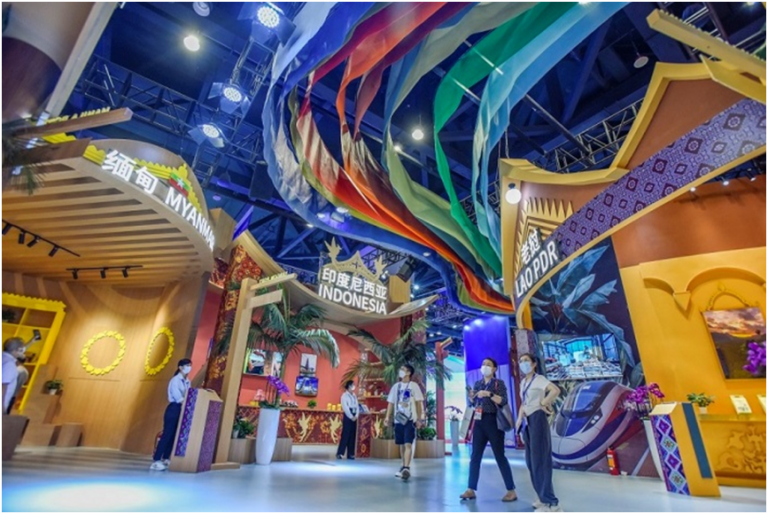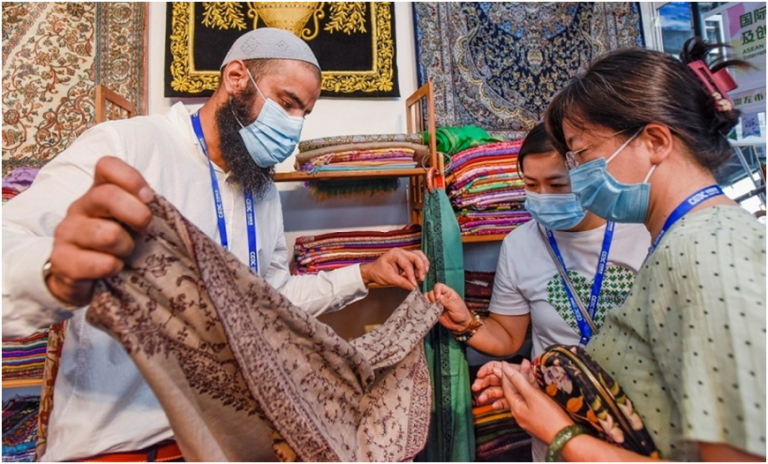
By ZhangYunhe, Zhu Jiaqi, People’s Daily
The 19th China-ASEAN Expo and China-ASEAN Business and Investment Summit concluded in Nanning, capital of south China’s Guangxi Zhuang autonomous region, on Sept. 19.
The four-day event, themed “Sharing RCEP (Regional Comprehensive Economic Partnership) New Opportunities, Building a Version 3.0 China-ASEAN Free Trade Area,” expanded the circle of friends for open cooperation under the RCEP framework and made positive contributions towards building a closer China-ASEAN community with a shared future.
The expo featured 88 economic and trade events held in-person and virtually. They facilitated more than 3,500 trade and project cooperation matches, and around 1,000 were made online.
The exhibition area reached 102,000 square meters this year, where a total of 5,400 exhibition booths were set up by 1,653 enterprises. Besides, over 2,000 enterprises joined the event online.
“Many foreign merchants took interpreters to the expo to enquire about sewage purifiers and relevant technologies. We saw broad market prospects given the emphasis placed by ASEAN countries on environmental protection,” said XueDongning, manager of the administrative department of an environmental protection investment company based in GuangxiZhuang autonomous region that has joined the expo for seven consecutive years.
Xue believes that the China-ASEAN Expo not only provides a platform for economic and trade cooperation but also facilitates intercompany exchanges.

PungKheav Se, president of the Federation of Khmer Chinese in Cambodia, said that more and more ASEAN countries have become desirable investment destinations for Chinese enterprises.
“The 19th China-ASEAN Expo helped ASEAN countries and China, especially Cambodia and China grasp the new opportunities brought about by the implementation of the RCEP, and made positive contributions to promoting bilateral and multilateral economic cooperation,” said Kheav Se.
South Korea participated in the expo as a specially invited partner this year, and an investigation tour to Guangxi was paid by a delegation of representatives from South Korean companies.
It is hoped that South Korea, China and ASEAN countries, as close neighbors, could push for closer cooperation in economy, culture and social affairs to jointly respond to global challenges, said South Korean Trade Minister AhnDuk-geun.
“Since the RCEP took effect this January, it has been joined by more and more countries. Our circle of friends is getting larger and larger,” said ZhangShaogang, vice chairman of the China Council for the Promotion of International Trade.

China’s trade with ASEAN countries surged 13 percent year on year in the first seven months of this year, accounting for 15 percent of China’s total foreign trade during the period, according to the vice chairman.
During this year’s China-ASEAN Expo, 267 international and domestic cooperation projects were signed, with a total investment of over 400 billion yuan ($56.4 billion), up 37 percent from the previous year.
About 76 percent of the volume came from enterprises in the Guangdong-Hong Kong-Macao Greater Bay Area, the Yangtze River Economic Belt, the Beijing-Tianjin-Hebei region and other major areas. Besides, the expo witnessed a new record in the number of provinces signing cooperation projects.
“The expo fully demonstrated the strong resilience of China-ASEAN economic ties. It has offered firm support for and made great contributions to the economic recovery of the region,” said WeiZhaohui, secretary-general of the expo’s secretariat and deputy director-general of the Guangxi International Expo Affairs Bureau.
China-Malaysia bilateral trade surged 34.5 percent year on year to $176.8 billion last year. As the Country of Honor of the 19th China-ASEAN Expo, Malaysia sent 34 enterprises to the event. Twenty-three of them attended the event in-person, while 11 joined it online. Most of these enterprises are in food and beverage, healthcare, as well as petroleum and gas industries.
Malaysian Prime Minister Ismail SabriYaakob said the China-ASEAN Expo is an important platform for driving regional economic recovery and enhancing China-ASEAN trade exchanges. He said Malaysia hopes to further strengthen its trade ties with China and elevate the ties to a new level through multiple initiatives and measures.










